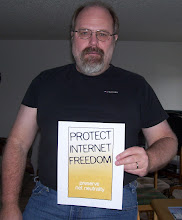
Security men tackle a protester, left, as Stephane Diagana, right, the 400-meter world champion in 1997 who is now president of France's national athletics league, carries the Olympic torch at the beginning of its relay from the first floor of the Eiffel tower in Paris, Monday, April 7, 2008. Security officials have extinguished the Olympic flame amid heavy protests during the torch relay in Paris. Police in jogging gear put the flame out and brought it aboard a bus, apparently to move it away from protesters. The flame was being carried down a road along the Seine River amid demonstrators carrying Tibetan flags when the relay was stopped. It is not immediately clear what police plan next, or when or where the relay will resume.(AP Photo/Christophe Ena)
http://www.youtube.com/watch?v=AArnnKwFTxE
Olympic Torch Relay Descends Into Chaos
Apr 7, 9:39 AM (ET)
By JEROME PUGMIRE and ELAINE GANLEY
PARIS (AP) - Security officials snuffed out the Olympic torch and carried it through Paris in the safety of a bus at least five times Monday as chaotic protests against China's human rights record turned the relay into a chaotic series of stops and starts.
Despite massive security, at least two activists got within almost an arm's length of the flame before they were grabbed by police. A protester threw water at the torch but failed to extinguish it and was taken away. Officers tackled numerous protesters and carried some away.
At the start of the relay, on the Eiffel Tower's first floor, Green Party activist Sylvain Garel lunged for the first torchbearer, former hurdler Stephane Diagana, shouting "Freedom for the Chinese!" Security officials pulled Garel back.
"It is inadmissible that the games are taking place in the world's biggest prison," Garel said later.
The procession continued but, soon after, a crowd of activists waving Tibetan flags interrupted it for the first time by confronting the torchbearer on a road along the Seine River. The demonstrators did not appear to get close to the torch, but its flame was put out by security officers and brought on board a bus to continue along the route.
Less than an hour later, the flame was being carried out of a Paris traffic tunnel by an athlete in a wheelchair when the procession was halted by activists who booed and chanted "Tibet." Once again, the torch was temporarily extinguished and put on a bus despite protesters' apparent failure to get close.
Some 3,000 officers were deployed on motorcycles, in jogging gear and using inline roller skates. Still, police barely stopped the second rush at the torch, and the attempt to extinguish it with water. Other demonstrators scaled the Eiffel Tower and hung a banner depicting the Olympic rings as handcuffs.
The torch was extinguished for the third time when police interrupted the procession as a precaution because they spotted a crowd of demonstrators on a bridge they were approaching.
The torch disappeared back inside the bus a fourth time shortly after a protester approached it with a fire extinguisher near the Louvre art museum. Police grabbed the demonstrator before he could start to spray.
The flame was whisked into a bus again outside the National Assembly, where protesters gathered. A session of parliament was interrupted and a banner on the building read: "Respect for Human Rights in China." City Hall draped its building with a banner reading, "Paris defends human rights around the world."
Other demonstrators scaled the Eiffel Tower and Notre Dame cathedral and hung banners depicting the Olympic rings as handcuffs.
Police said they did not immediately have a count of the number of arrests. Mireille Ferri, a Green Party official, said she was held by police for two hours because she approached the Eiffel Tower area with a fire extinguisher. In various locations throughout the city, activists angry about China's human rights record and repression Tibet carried Tibetan flags and waved signs reading "the flame of shame."
Riot police squirted tear gas to break up a sit-in protest by about 300 pro-Tibet demonstrators who blocked the torch route.
"The flame shouldn't have come to Paris," said protester Carmen de Santiago, who had "free" painted on one cheek and "Tibet" on the other.
Torchbearer Diagana said he was disappointed to see the protests, though he understood why activists were there.
"Nothing is happening as planned. It's unfortunate," he told France 2 television.
At least one athlete was supportive of demonstrators. Former Olympic champion Marie-Jose Perec told French television: "I think it is very, very good that people have mobilized like that."
France's former sports minister, Jean-Francois Lamour, said that though the torch had been put out, the Olympic flame itself still burned in the lantern where it is kept overnight and on airplane flights.
"The torch has been extinguished but the flame is still there," he told France Info radio.
Police had hoped to prevent the chaos that marred the relay in London a day earlier. There, police had repeatedly scuffled with activists angry about China's human rights record leading up to the Beijing Olympics Aug. 8-24. One protester tried to grab the torch; another tried to snuff out the flame with what appeared to be a fire extinguisher. Thirty-seven people were arrested.
In Paris, police had drawn up an elaborate plan to try to keep the torch in a safe "bubble." Torchbearers were encircled by several hundred officers, some in riot police vehicles and on motorcycles, others on skates or on foot. Boats patrolled the Seine River that slices through the French capital, and a helicopter flew overhead.
About 80 athletes had been slated to carry the torch over the 17.4-mile route that started at the Eiffel Tower, heading down the Champs-Elysees avenue toward City Hall, then crosses over the Seine before ending at the Charlety track and field stadium.
Across town, City Hall draped its building with a banner reading, "Paris defends human rights around the world."
One torch bearer, two-time French judo gold medalist David Douillet, told RTL radio that he regretted the choice of China, "because it isn't up to snuff on freedom of expression, on total liberty, and of course, on Olympic values."
French President Nicolas Sarkozy has left open the possibility of boycotting the Olympic opening ceremony in Beijing depending on how the situation evolves in Tibet. Foreign Minister Bernard Kouchner said Monday that was still the case.
Activists have been protesting along the torch route since the flame embarked on its 85,000-mile journey from Ancient Olympia in Greece to Beijing.
The torch's round-the-world trip is the longest in Olympic history, and it is meant to shine a spotlight on China's economic and political power. Activists have seized upon it as a backdrop for their causes, angering Beijing.
Beijing organizers criticized London's protesters, saying their actions were a "disgusting" form of sabotage by Tibetan separatists.
"The act of defiance from this small group of people is not popular," said Sun Weide, a spokesman for the Beijing Olympic organizing committee. "It will definitely be criticized by people who love peace and adore the Olympic spirit. Their attempt is doomed to failure."
The torch relay also is expected to face demonstrations in San Francisco, New Delhi and possibly elsewhere on its 21-stop, six-continent tour before arriving in mainland China May 4.
__
Associated Press writer Angela Doland contributed to this report.
Reality Catcher






























No comments:
Post a Comment